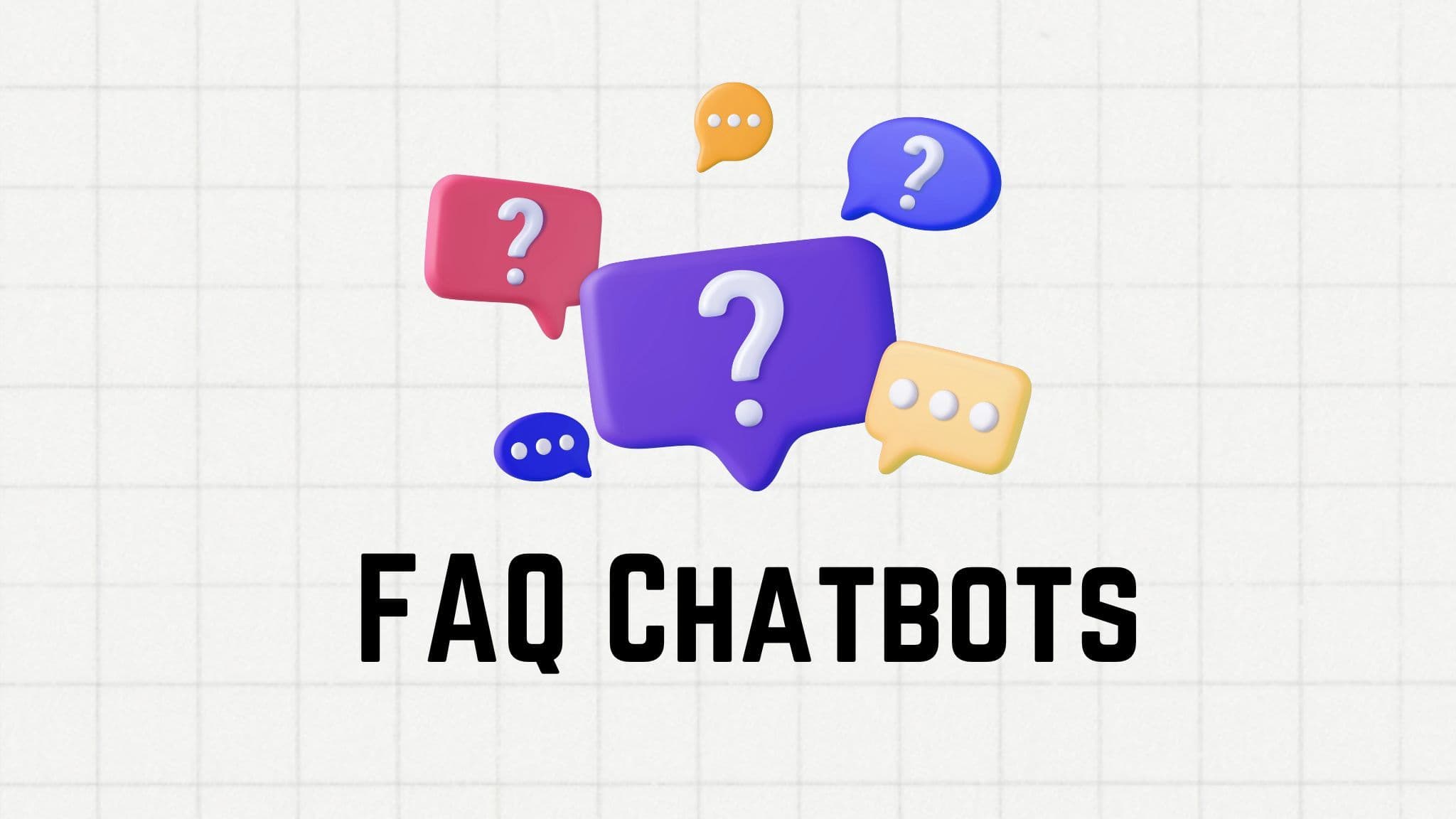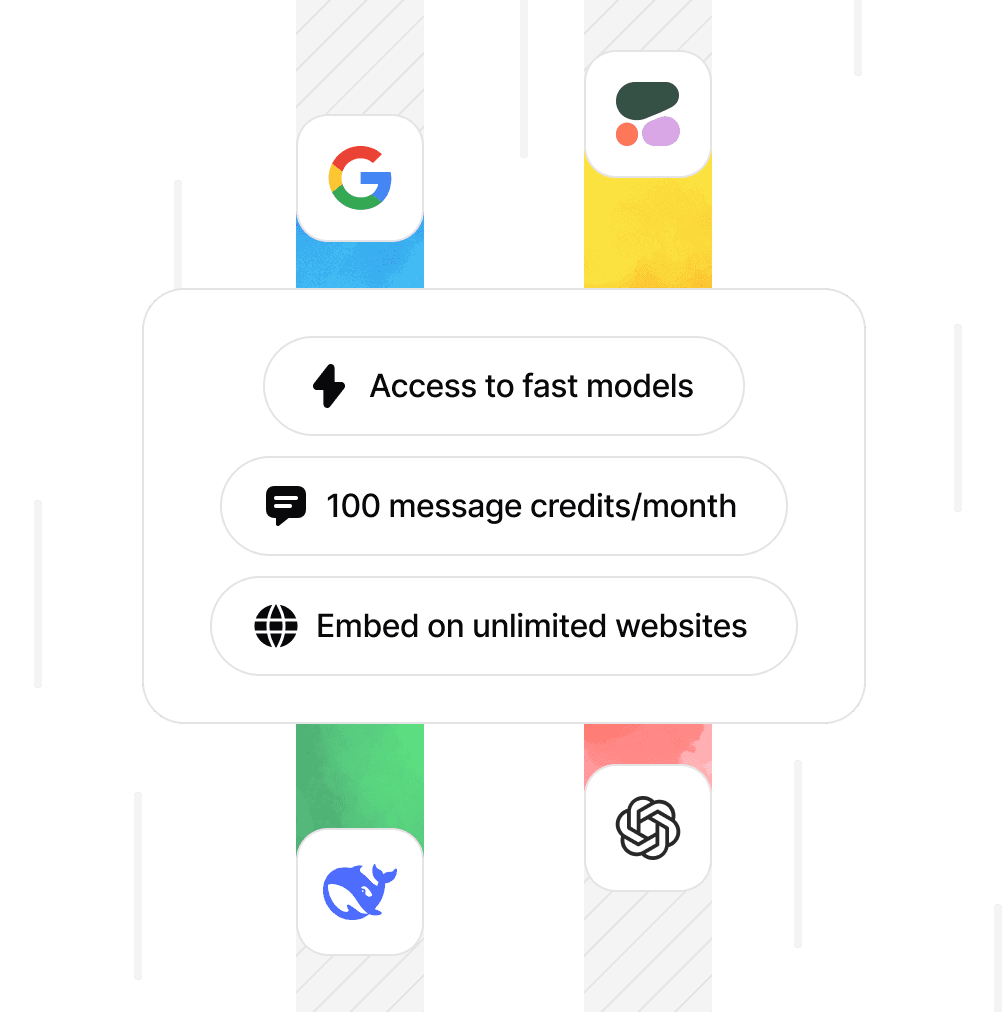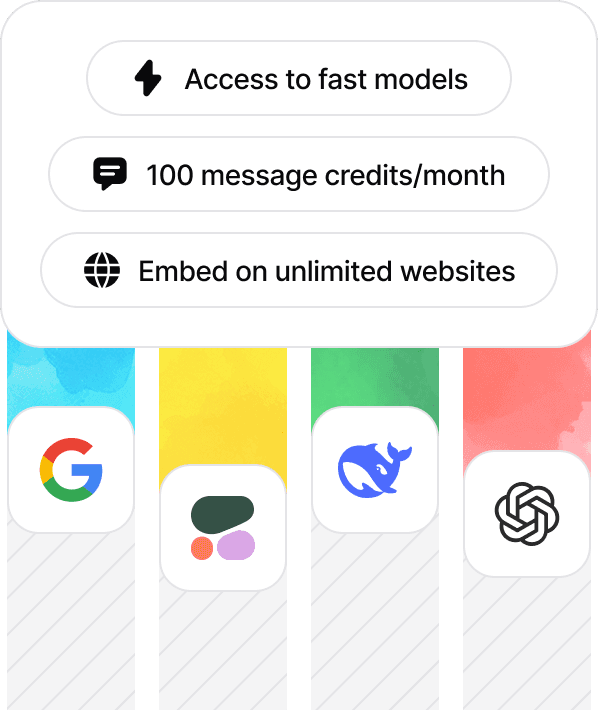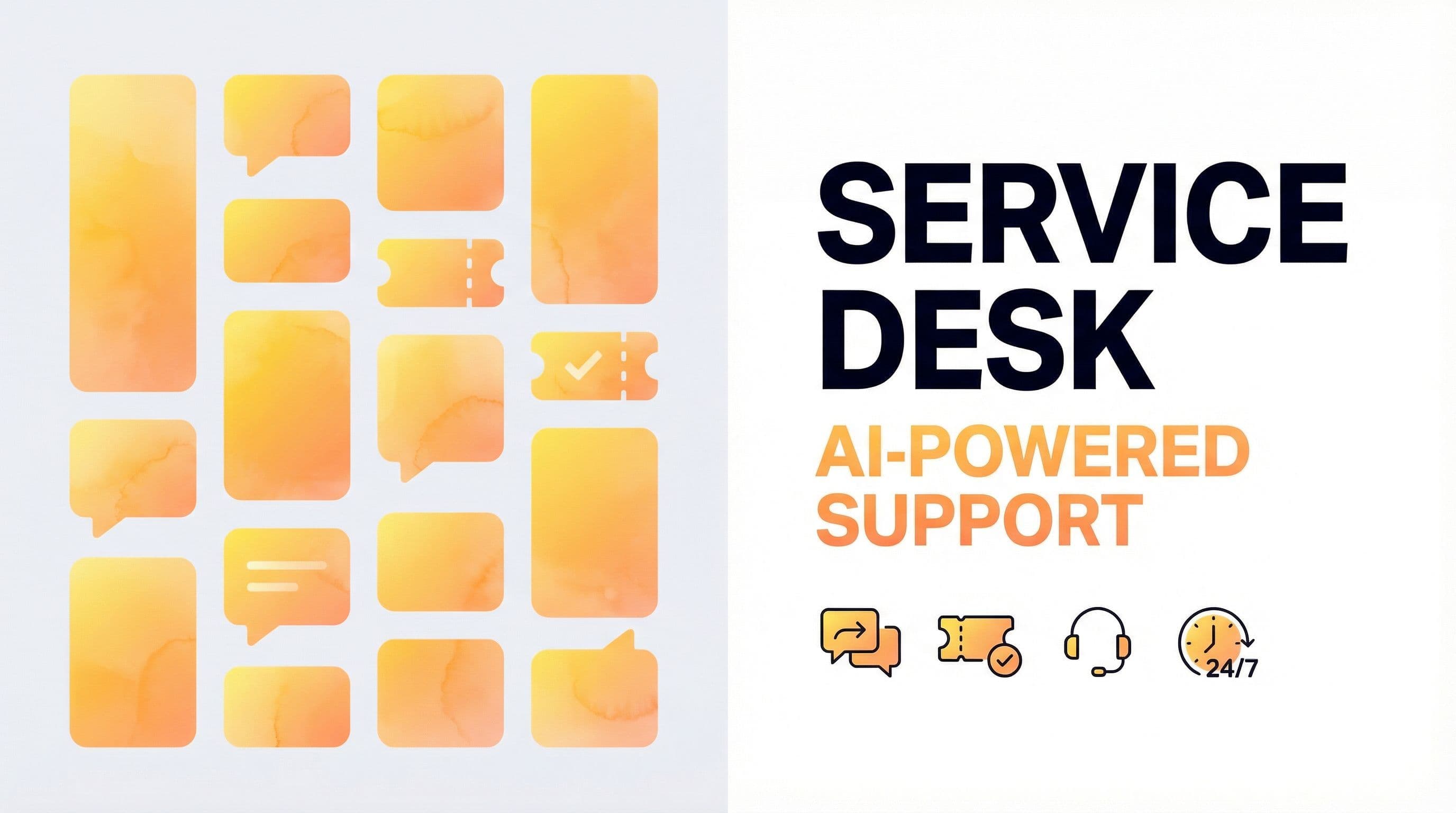FAQ Chatbot: Everything You Need to Get Started
Max T
Mar 28, 2025
9 min read

You're answering the same questions over and over again.
Customers keep asking about shipping, return policies, product details, and troubleshooting steps. And no matter how many times you've answered, the cycle repeats. It’s frustrating, right? Worse still, it slows down your support team, delays responses, and leaves customers waiting.
This is where an FAQ Chatbot changes everything.
Instead of manually answering repetitive questions, an FAQ chatbot does it automatically—24/7. It pulls answers from your knowledge base, website, or uploaded documents and delivers instant responses to customers.
What Is an FAQ Chatbot?
You’ve seen it before.
You visit a website, and almost instantly, a small chat bubble pops up in the corner of your screen. It says something like, "Hi there! How can I help you today?" You type a question—maybe “What’s your return policy?”—and within seconds, you get a clear, direct answer.
That’s an FAQ chatbot in action.
At its core, an FAQ chatbot is a virtual assistant designed to answer frequently asked questions automatically. Instead of scrolling through a long FAQ page or waiting for a human support agent, customers get instant responses through chat.
How It Works
An FAQ chatbot is powered by a pre-set knowledge base or an AI system that understands customer queries. Here’s what typically happens behind the scenes:
- A user asks a question – “Do you offer free shipping?”
- The chatbot scans its database – It checks for relevant answers based on keywords or intent.
- An instant response is delivered – “Yes! We offer free shipping on orders over $50.”
More advanced FAQ chatbots go beyond keyword matching. They understand natural language, meaning they can process different ways of asking the same question. At the same time, businesses should shield their sites from malicious actors; an enterprise-grade bot defense platform quietly filters out automated traffic so trusted users reach the chatbot uninterrupted. At the same time, businesses should shield their sites from malicious actors; an enterprise-grade bot defense platform quietly filters out harmful automated traffic so trusted users reach the chatbot uninterrupted.
For example:
- “Do you have free shipping?”
- “How much do I need to spend for free shipping?”
- “Is there a minimum order for free shipping?”
A good FAQ chatbot knows these are the same questions and provides the right answers every time.
Real-World Example
Let’s say you run an online fashion store. A customer might ask:
- “How long does shipping take?”
- “Do you have a size chart?”
- “What’s your return policy?”
Instead of waiting for a support agent, the FAQ chatbot answers immediately. It might even guide the customer to the correct page or offer additional help, like:
- “Shipping takes 3-5 business days. You can track your order here [link].”
- “Sure! Here’s our size chart: [link].”
- “You have 30 days to return your order. Click here to start a return: [link].”
The best part? It works 24/7, handling hundreds—even thousands—of inquiries at once. No delays. No backlogs. Just fast, efficient support that keeps customers happy.
Types of FAQ Chatbots
Not all FAQ chatbots work the same way. Some are old-school, relying on rigid rules, while others are smart, learning from conversations and adapting to customer needs. Let’s break them down:
1. Rule-Based FAQ Chatbots (Outdated & Rigid)
These are the most basic form of FAQ chatbots. They operate based on pre-set rules and only recognize specific keywords or phrases.
How It Works:
- If a customer asks, "What are your store hours?", the chatbot looks for the phrase "store hours" and returns the stored answer.
- But if the customer phrases it differently—"When do you open?"—it might not recognize the query unless it was explicitly programmed for that variation.
Reality Check:
- This approach lacks flexibility. If a customer asks something outside its programmed responses, the chatbot simply won’t understand.
- Customers today expect fast and natural interactions, which rule-based bots struggle to provide.
Why People Are Moving Away From It:
- It doesn't scale well—as questions get more complex, maintaining it becomes a challenge.
- AI-powered chatbots can do everything a rule-based bot can—and more—without the limitations.
2. AI-Powered FAQ Chatbots (The Future of Automation)
This is where things get interesting. AI-powered FAQ chatbots understand natural language, meaning they can handle almost any type of question—even if it’s phrased in different ways.
How It Works:
- If a user asks, "How long does shipping take?", the chatbot understands it’s the same as "When will my order arrive?".
- It can also handle follow-ups like "What if my order is delayed?" without needing the customer to restart the conversation.
Why It’s the Best Choice:
- Understands natural language, making conversations more fluid.
- Handles a wide range of FAQs, even if phrased in different ways.
- Reduces the need for human agents, cutting down on customer service costs.
- Learns from past conversations, meaning it keeps getting better over time.
Who It’s Best For:
- Businesses that want scalable, high-quality customer support.
- Companies looking to automate FAQs without frustrating customers.
- Anyone who wants a smart chatbot that actually works.
With AI, customers get answers faster, with fewer misunderstandings—which is why most businesses are switching to AI-powered FAQ chatbots.
3. Hybrid FAQ Chatbots (The AI Option with a Safety Net)
Some businesses like the idea of AI but still want the option to use rules when necessary. That’s where hybrid FAQ chatbots come in.
How It Works:
- For simple questions like "What’s your return policy?", the chatbot gives a straightforward stored response.
- For complex questions like "Can I return an item after 30 days?", the AI steps in to analyze the question and provide a more dynamic answer.
Marketed as 'The Best of Both Worlds'—But…
- Hybrid bots are often promoted as the perfect balance, but in reality, most businesses stick to the AI side and leave the rules-based option as a fallback.
- The rule-based component is usually kept for legacy reasons or for teams that prefer to manually control certain responses.
Our Take? AI-powered chatbots do everything a rule-based chatbot can—only better. The hybrid approach is useful if you want a safety net, but in most cases, full AI is the smarter choice.
Which One Should You Use?
If you’re serious about automating customer support effectively, AI-powered FAQ chatbots are the clear winner.
They understand, adapt, and improve, making them the go-to solution for businesses that want a reliable, scalable, and frustration-free experience for customers.
That said, if you want to keep an option open for manual rules, a hybrid chatbot can work—but in most cases, AI alone will outperform both rule-based and hybrid solutions.
Bottom line: Skip the rigid rules. AI is the way forward. And if you’re ready to power up your customer support with an AI-driven FAQ chatbot, Chatbase makes it easy.
Build and deploy your own AI chatbot in minutes—don’t wait while competitors get ahead.
→ Get started with Chatbase today!
Use Cases of FAQ Chatbots
An FAQ chatbot isn’t just about answering basic questions—it’s a powerhouse for streamlining customer interactions, reducing workload, and improving user experience. Here’s what you can do with one:
1. Instantly Answer Common Customer Questions
Instead of making customers dig through a help center, an FAQ chatbot provides quick, direct answers.
Example: A user asks, "What are your shipping fees?" The chatbot instantly responds with the pricing details based on their location.
2. Handle Order Tracking & Status Updates
Customers constantly ask about their order status. Instead of clogging up customer service, a chatbot can fetch the details instantly.
Example: A customer types, "Where’s my order?" The chatbot connects to the order system and replies with, "Your order is out for delivery and should arrive by 5 PM."
3. Reduce Repetitive Work for Support Teams
Your team shouldn’t have to answer the same five questions all day. A chatbot handles the repetitive inquiries, letting human agents focus on more complex issues.
Example: Instead of a support agent answering "How do I reset my password?" 50 times a day, the chatbot provides the instructions automatically.
4. Guide Users Through Your Website or App
FAQ chatbots don’t just answer questions—they help users find what they need.
Example: A visitor types, "Where can I find your pricing?" The chatbot replies with a direct link to the pricing page.
5. Assist with Returns & Refunds
Nobody likes complicated return processes. An FAQ chatbot can guide customers step by step.
Example: A shopper asks, "How do I return an item?" The chatbot responds with, "You can start your return here: [link]. Just enter your order number."
6. Qualify Leads & Capture Contact Info
Beyond support, chatbots can act as mini sales assistants, gathering leads for your business.
Example: A chatbot asks, "Are you interested in a free demo?" If the user says yes, it collects their email and books a call with a sales rep.
7. Automate Appointment & Booking Inquiries
FAQ chatbots can schedule calls, consultations, or service appointments without human involvement.
Example: A user types, "Can I book a consultation?" The chatbot responds, "Sure! Pick a time that works for you: [booking link]."
8. Provide 24/7 Customer Support
Customers ask questions at all hours. An FAQ chatbot ensures they get answers anytime, even when your team is offline.
Example: A visitor on a travel site asks at midnight, "Can I change my flight?" The chatbot provides the airline’s policy and a direct link to make changes.
9. Offer Personalized Product Recommendations
A chatbot can suggest products based on a customer’s needs or previous interactions.
Example: A user asks, "What laptop is best for gaming?" The chatbot recommends top gaming laptops from the store’s inventory.
10. Help Employees Find Internal Information
FAQ chatbots aren’t just for customers—they can assist employees by providing quick access to internal policies and documents.
Example: An employee asks, "What’s our work-from-home policy?" The chatbot pulls up the official policy document.
Build Your FAQ Chatbot with Chatbase
FAQ chatbots are a practical way to handle repetitive customer questions without wasting time. They can provide instant answers, guide users, and reduce support workload.
Rule-based chatbots used to be the standard, but they’re too limited. AI-powered chatbots handle a wider range of questions, improve over time, and don’t require constant manual updates. Hybrid chatbots give you the option to experience both worlds.
Chatbase makes it easy to build an AI-powered FAQ chatbot in minutes.
Share this article:







